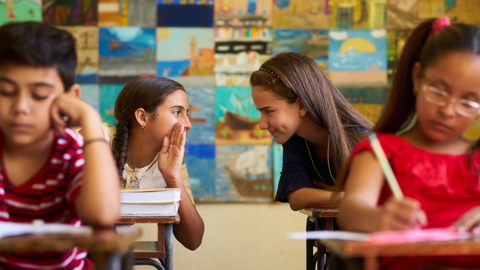Course for teachers working with gypsy pupils in situations of vulnerability
On 2 October, the UAB Faculty of Arts & Humanities will host the presentation of the course Realidad Educativa en la Comunidad Gitana en Exclusión, aimed at professionals and students of education and social sciences working with gypsy pupils who are in situations of vulberability. This free and mainly online course is organised by the Romanò Institute for Social and Cultural Affairs, in collaboration with the UAB, and is funded by the Spanish Ministry for Social Rights, Consumption and 2020 Agenda. The course is open to 50 people and will take place from 2 October to 19 December.

"The training of teachers is essential, since many are unfamiliar with how to interact with ethnic minorities"
The presentation of the course "Realidad Educativa en la Comunidad Gitana en Exclusión" will take place on 2 October at the UAB and will include the participation of Esther Zapater, Secretary General of the UAB; Fernando Macías Aranda, director of the Equal Treatment and Non-Discrimination Office of the Ministry for Equality and Feminism of the Government of Catalonia; and Juan de Dios Ramírez Heredia, co-founder of the Romanò Institute for Social and Cultural Affairs (IRASC). The subject of the course is related to the UAB's theme for this academic year: diversity.
This free course is funded by the Ministry for Social Rights, Consumption and the 2030 Agenda, and is addressed to professionals and students from the education and social sectors working with gypsy pupils who are in situations of vulnerability.
The objective of the course is to train professionals that can guarantee inclusion in their classrooms, adapting the education system to current learning needs. With this in mind, it is necessary to rethink paedagogical practices, foster inclusive environments and value diversity as an educational resource. "This includes catering to both individual differences and cultural aspects, and taking on disruptive behaviour with effective strategies that foster integration in multi-ethnic classrooms. The training of teachers is essential, given that many do not know how to intervene with ethnic minorities", explain members of the Institute Romanò for Social and Cultural Affairs.
The 35-hour course will include issues such as good practices and innovative educational strategies when dealing with absenteeism and school abandonment in which there is a risk of social exclusion. It will also focus on inclusion and equality, prejudices, stereotypes, antigypsyism or discrimination against gypsies, attention to diversity, gender perspective applied to education, etc..
The course will be offered on Thursdays and lasts until December. The first session, on 2 October, will be classroom-based and will take place from 4:30 to 8:00 p.m. All other sessions will be held online, from 5:00 to 7:00 p.m., except for the last session, which wil be held from 4:30 to 8:00 p.m. The course offers 50 places for teachers from across Catalonia. It is organised by the Institute Romanò for Social and Cultural Affairs, an entity aiming to comprehensively promote the Gypsy people at social, cultural and human level, and foster the conservation and evolution of their traditions and customs.
For more information about the course please visit Realitat Educativa Gitana II Edició 2025